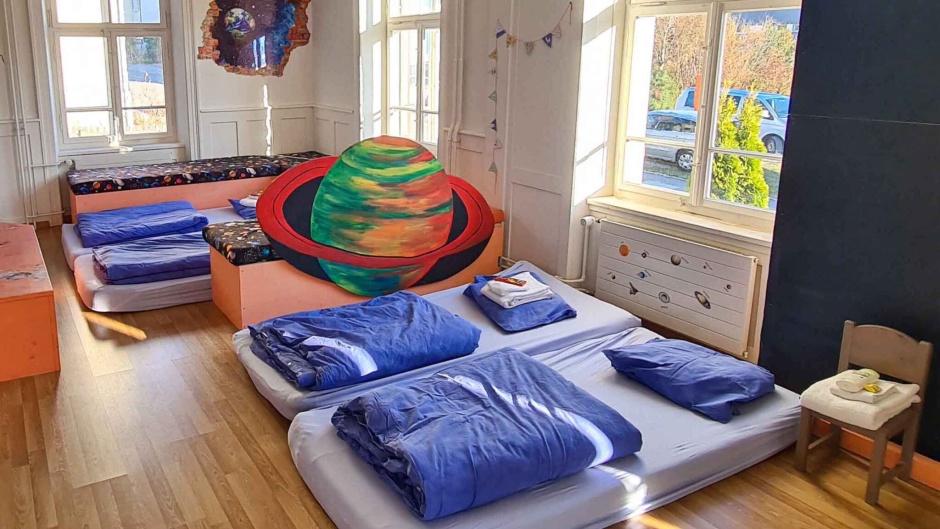European leaders denounce “a parody of democracy”, NATO speaks of “dangerous escalation”, and the United Nations General Assembly seeks dialogue-based solutions.
![A building hit in Irpin, Ukraine. / Photo: [link]Nick Tsybenko[/link].](https://cms.evangelicalfocus.com/upload/imagenes/632ade3615018_nick-tsybenko-D6iFdd5dv5Q-unsplash(1)Cropped.jpg) A building hit in Irpin, Ukraine. / Photo: [link]Nick Tsybenko[/link].
A building hit in Irpin, Ukraine. / Photo: [link]Nick Tsybenko[/link].
210 days after the beginning of the invasion of Ukraine, the President of Russia has announced it will immediately mobilise 300,000 reservists to fight in what in February was described as a short-termed “special military operation”.
The citizens called to join the Russian army are those with previous fighting experience or with regular training. The mobilisation comes into effect immediately, on 21 September, which happens to be the International Peace Day.
On the speech aired on national television, Putin claimed that “the entire Western military complex” is being fought by Moscow, and that he was ready to respond with nuclear weapons “to protect Russia and our people”, which included citizens in occupied regions of Ukraine. The day before, the Duma (Russia’s parliament) passed a law of 10-year prison sentence against citizens who refuse to fight.
Putin also said he “supports” the referendums to join the Russian Federation organised by pro-Russian leaders in the occupied Ukrainian territories of Donetsk, Luhansk, and Russian-controlled parts of Zaporizhzhia and Kherson. These are expected to be held between 23 and 27 September.
These moves by Russia come after suffering defeats on the battlefield and receiving negative responses from international partners such as China and India, whose governments are urging Putin to put an end to the war as soon as possible.
These moves have been described in Europe as a dangerous escalation. “No sham referenda will change Europe’s stance on Ukraine and its territorial integrity. Nor will it change the fact that it was Russia that invaded sovereign Ukraine”, said the president of the European Parliament, Roberta Metsaola.
To be clear: no sham referenda will change Europe's stance on Ukraine and its territorial integrity. Nor will it change the fact that it was Russia that invaded sovereign Ukraine.
Europe stands with Ukraine
— Roberta Metsola (@EP_President) September 20, 2022
German Chancellor Olaf Scholz added that “the fictitious referenda are not covered by international law or supported by the international community”. Speaking from the General Assembly of the United Nations in New York, French President Emmanuel Macron said it was Russia wanted “a return to the age of imperialism”. Lithuanian President Gitanas Nauseda, added: “What Russia is doing in Donetsk, Luhansk and other occupied territories of Ukraine is a parody of democracy, it's an attempt to cover the true face of the totalitarian regime”.
Meanwhile, the military alliance NATO, has defined the last Russian moves as “a further escalation in Putin’s war”, adding that “the international community must condemn this blatant violation of international law and step up support for Ukraine”.
Rumours of a mobilisation of reservists already caused an exodus of many young Russian men in February, shortly when the invasion started. The partial mobilisation may again cause fear among Russian citizens, as the prospects are that the number of deaths on the battlefield will only increase.
Russia’s Foreign Ministry has admitted that around 6,000 of its soldiers have died since the beginning of the invasion – but it is estimated that the real figures could be up to five times higher.
This week, New York is hosting the 193th annual General Assembly of the United Nations, the “the biggest diplomatic week of the year”, with the participation of political leaders from all across the world. During the Assembly, the new steps taken by Russia in the war of Ukraine are likely to be addressed by most countries, including Ukraine in President’s Zelenskiy later today. The Secretary General of the UN, António Guterres, said: “We live in a world in which dialogue and cooperation is the only path forward”, adding: “Our world is in big trouble”.
[analysis][title]Christian support for Ukrainians [/title][photo] 
[/photo][text]Since the beginning of the war, Christian organisations inside Ukraine and also in other countries such as Poland, Moldova, Romania, Hungary and others, have invested themselves in supporting refugees fleeing Ukraine.
International networks organised to welcome refugees in other European countries were set up. While hundreds of evangelical churches serve their neighbours in Ukraine’s cities, many other are helping asylum seekers find a home and work in other countries.
By September 2022, more than 7.2 million refugees had fled Ukraine since the invasion started in February.
[/text][/analysis]
[donate]

Las opiniones vertidas por nuestros colaboradores se realizan a nivel personal, pudiendo coincidir o no con la postura de la dirección de Protestante Digital.
Si quieres comentar o